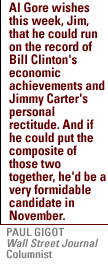| CONVENTION WRAP | |
August 14, 2000 |
|

|
Mark Shields and Paul Gigot, and our historians, preview the first day of the Democratic National Convention.
|
|
JIM LEHRER: Some final convention preview words now from Shields and Gigot: Syndicated columnist Mark Shields; Wall Street Journal columnist Paul Gigot. First Jimmy Carter, listening to him, Mark, how do rank and file Democrats feel about Jimmy Carter now?
JIM LEHRER: What were the wounds? MARK SHIELDS: The wounds were that Jimmy Carter took the party to enormous defeat in 1980, whether consciously or whatever, just caught up in history's currents. But you'll recall when Ronald Reagan won in 1980, carrying 44 of the 50 states against Jimmy Carter, after 25.7 percent inflation in 1979/1980, the Republicans were in the Senate for the first time in 26 years. So there's a sense that Jimmy Carter left under really unhappy circumstances. And the party didn't feel that they missed him. But I think there's really a sense in listening to him, I was just struck by the fact the Democrats have only won the White House three times in the last fifty years, three different candidates. And this is a party -- all of the votes are either on each coast or in the Northeast and the Midwest. And the only three people who have won have all be Southerners. JIM LEHRER: Now, how do you explain that? MARK SHIELDS: Well, it's almost as though they need that credential of cultural traditionalism, of social moderation, maybe of economic moderation, as well, that the southern pedigree brings to it for a party that has been historically northern and liberal. JIM LEHRER: What are your thoughts about Jimmy Carter?
JIM LEHRER: Moving toward the center. PAUL GIGOT: And culturally conservative; Jimmy Carter won in 1976 with an awful lot of evangelical Christians in the wake of Watergate -- he captured some southern states. He recognized cultural weakness of the party long before many of the other Democratic partisans did, and it took them 12 years in the wilderness before they would come back and look at Bill Clinton, another southern governor, and say, okay we'll follow you on the death penalty, we'll follow you on crime, we'll follow you on welfare reform. Jimmy Carter, he wasn't beaten only because of his mismanagement. He was defeated because of a challenge from Ted Kennedy, because his own Democrats in Congress wouldn't find a way to cooperate with him. |
 |
||||||||||||||||||
| Life after the White House | ||||||||||||||||||||
|
JIM LEHRER: Were you struck, as I was, by his words to Ray that, "I told Bill Clinton that my most productive years were after I left the White House? -- after I was President of the United States?" What do you think about that, what that says? MARK SHIELDS: Well, I mean.... JIM LEHRER: I think the word was productive. Rewarding. MARK SHIELDS: Rewarding. JIM LEHRER: Okay.
JIM LEHRER: What did you make of Bill Bradley's words? PAUL GIGOT: Gracious. Not effusive. But he's not an effusive personality. But I think he's handled his defeat about as well as you can expect -- I think even better than John McCain. JIM LEHRER: You think so? Why?
JIM LEHRER: He was still on stage too. PAUL GIGOT: And he went down to South Carolina and he interjected himself in the flag dispute, which Gore was trying to use against Bush and said I was wrong. And that really didn't settle too well with an awful lot of Republicans. Bradley on the other hand, he left the stage. He went back. JIM LEHRER: He really did just go away, didn't he? PAUL GIGOT: That's right. He said, I've been defeated. He only came back to come back in Wisconsin to have a public event endorsing Al Gore, just one big event -- and now this. And that's... it's got to be difficult for him because he's a man of great pride. He really thinks he should be President. And he came close. JIM LEHRER: Can he in fact help Al Gore, Mark?
|
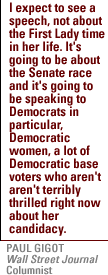 |
|||||||||||||||||||
| Bradley, McCain, Hillary Clinton | ||||||||||||||||||||
|
JIM LEHRER: He moved right on to the November election. MARK SHIELDS: That's right. JIM LEHRER: Yeah, yeah.
JIM LEHRER: We'll have plenty of time later on in our convention coverage tonight to talk more about Bill Clinton and all that, the follow up on what the historians were talking about, but what about Hillary Clinton? Hillary Clinton's going to be talking tonight. She's got two sides of the street to walk down, one as the First Lady, about to be part of a legacy. And then the other part, she's starting a legacy of her own or trying to as a United States Senator. PAUL GIGOT: This is going to be... I expect to see a speech, not about the First Lady time in her life. It's going to be about the Senate race and it's going to be speaking to Democrats in particular, Democratic women, a lot of Democratic base voters who aren't aren't terribly thrilled right now about her candidacy. They don't like the way she's handled her marriage or the reflected glory with which she is using to run. And she's going to speak to them, I think, directly, and say, "Here's what I've done. Here's what I can do for you."
JIM LEHRER: You think she will talk as a candidate? MARK SHIELDS: I think it's a campaign document, whether, in fact, it's vote for Hillary is a closing line... JIM LEHRER: Well, we'll see. Thank you both very much. |
|
|||||||||||||||||||
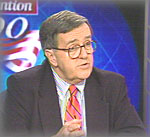 MARK
SHIELDS: I think time has healed a lot of the wounds, Jim.
MARK
SHIELDS: I think time has healed a lot of the wounds, Jim. 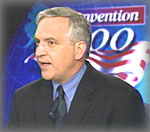 PAUL
GIGOT: First of all, he's been one of our greatest ex-presidents. I
don't think anybody would dispute what he's done with Habitat for Humanity,
what he's done in his role as a professor and a charitable worker. He
has been exemplary and has rehabilitated him in whatever problems, perceptions
people had about him personally; it's rehabilitated him. Second, I think
Mark is really on to something when he talks about Carter and the role
of his party, because in a way, 20 years later, Carter looks like he
might have been a little bit ahead of his time in this sense: He understood
some of the weaknesses of his party that Bill Clinton later identified
-- and it took...
PAUL
GIGOT: First of all, he's been one of our greatest ex-presidents. I
don't think anybody would dispute what he's done with Habitat for Humanity,
what he's done in his role as a professor and a charitable worker. He
has been exemplary and has rehabilitated him in whatever problems, perceptions
people had about him personally; it's rehabilitated him. Second, I think
Mark is really on to something when he talks about Carter and the role
of his party, because in a way, 20 years later, Carter looks like he
might have been a little bit ahead of his time in this sense: He understood
some of the weaknesses of his party that Bill Clinton later identified
-- and it took... 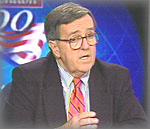 MARK
SHIELDS: David Gergen, our historian, has said that presidents who feel
that they leave as failed presidents devote an extraordinary amount
of time to rehabilitating their reputation for history. You point out
Richard Nixon writing the books, taking them back. Herbert Hoover, probably
the nation's leading public citizen for most of his life after the tragedy
of the Great Depression and Jimmy Carter certainly. I would add human
rights and his work for democracy abroad the way Paul was -- there's
no question Presidents who don't feel they've failed like Gerald Ford
has had a wonderful life and a happy life and a fulfilled life, but
hasn't felt that need. I think there's no question Jimmy Carter wants
people to do be aware of what he has done and done so well since then.
Al Gore wishes this week, Jim, that he could run on the record of Bill
Clinton's economic achievements and Jimmy Carter's personal rectitude.
And if he could put the composite of those two together, he'd be a very
formidable candidate in November.
MARK
SHIELDS: David Gergen, our historian, has said that presidents who feel
that they leave as failed presidents devote an extraordinary amount
of time to rehabilitating their reputation for history. You point out
Richard Nixon writing the books, taking them back. Herbert Hoover, probably
the nation's leading public citizen for most of his life after the tragedy
of the Great Depression and Jimmy Carter certainly. I would add human
rights and his work for democracy abroad the way Paul was -- there's
no question Presidents who don't feel they've failed like Gerald Ford
has had a wonderful life and a happy life and a fulfilled life, but
hasn't felt that need. I think there's no question Jimmy Carter wants
people to do be aware of what he has done and done so well since then.
Al Gore wishes this week, Jim, that he could run on the record of Bill
Clinton's economic achievements and Jimmy Carter's personal rectitude.
And if he could put the composite of those two together, he'd be a very
formidable candidate in November. 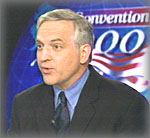 PAUL
GIGOT: Well, I think McCain was more grudging. In the end McCain came
on board big time at the convention and gave a great speech on behalf
of George W. Bush, but for a while there, he didn't leave all that graciously.
PAUL
GIGOT: Well, I think McCain was more grudging. In the end McCain came
on board big time at the convention and gave a great speech on behalf
of George W. Bush, but for a while there, he didn't leave all that graciously.
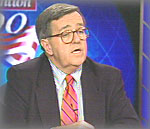 MARK
SHIELDS: I think he can help Al Gore because Bill Bradley's reputation
as a campaign reformer, as a political reformer, are peerless among
leading Democrats. And I think in that sense it brings a certain great
housekeeping seal of approval. I was struck as well, John McCain and
Bill Bradley, each of them came with an ace. You're talking about a
switch of 2,500 votes in New Hampshire and all of a sudden Bill Bradley's
David and Al Gore is a tottering Goliath, and John McCain obviously
the same thing. I thought John McCain made a little different attempt
when he endorsed George Bush. He discovered in George W. Bush virtues
that even his family had not detected over 52 or 53 years. He was really
quite effusive. Whereas in listening to Margaret's interview with Senator
Bradley, he chose to draw the contrast between the Democrats and the
Republicans.
MARK
SHIELDS: I think he can help Al Gore because Bill Bradley's reputation
as a campaign reformer, as a political reformer, are peerless among
leading Democrats. And I think in that sense it brings a certain great
housekeeping seal of approval. I was struck as well, John McCain and
Bill Bradley, each of them came with an ace. You're talking about a
switch of 2,500 votes in New Hampshire and all of a sudden Bill Bradley's
David and Al Gore is a tottering Goliath, and John McCain obviously
the same thing. I thought John McCain made a little different attempt
when he endorsed George Bush. He discovered in George W. Bush virtues
that even his family had not detected over 52 or 53 years. He was really
quite effusive. Whereas in listening to Margaret's interview with Senator
Bradley, he chose to draw the contrast between the Democrats and the
Republicans. 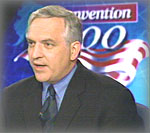 PAUL
GIGOT: Well, McCain was trying to do that because that's the kind of...
Bush's problem is he is unknown to an awful lot of people. They were
trying to give him a personal boost.
PAUL
GIGOT: Well, McCain was trying to do that because that's the kind of...
Bush's problem is he is unknown to an awful lot of people. They were
trying to give him a personal boost. 
